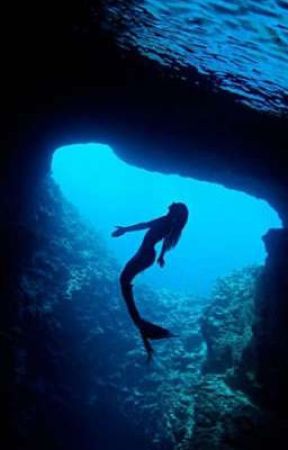FAR out in the ocean, where the water is as blue as the prettiest
cornflower, and as clear as crystal, it is very, very deep; so deep,
indeed, that no cable could fathom it: many church steeples, piled
one upon another, would not reach from the ground beneath to the
surface of the water above. There dwell the Sea King and his
subjects. We must not imagine that there is nothing at the bottom of
the sea but bare yellow sand. No, indeed; the most singular flowers
and plants grow there; the leaves and stems of which are so pliant,
that the slightest agitation of the water causes them to stir as if they
had life. Fishes, both large and small, glide between the branches,
as birds fly among the trees here upon land. In the deepest spot of
all, stands the castle of the Sea King. Its walls are built of coral, and
the long, gothic windows are of the clearest amber. The roof is
formed of shells, that open and close as the water flows over them.
Their appearance is very beautiful, for in each lies a glittering
pearl, which would be fit for the diadem of a queen.
The Sea King had been a widower for many years, and his aged
mother kept house for him. She was a very wise woman, and
exceedingly proud of her high birth; on that account she wore
twelve oysters on her tail; while others, also of high rank, were
only allowed to wear six. She was, however, deserving of very
great praise, especially for her care of the little sea-princesses, her
grand-daughters. They were six beautiful children; but the
youngest was the prettiest of them all; her skin was as clear and
delicate as a rose-leaf, and her eyes as blue as the deepest sea; but,
like all the others, she had no feet, and her body ended in a fish's tail. All day long they played in the great halls of the castle, or
among the living flowers that grew out of the walls. The large
amber windows were open, and the fish swam in, just as the
swallows fly into our houses when we open the windows,
excepting that the fishes swam up to the princesses, ate out of their
hands, and allowed themselves to be stroked. Outside the castle
there was a beautiful garden, in which grew bright red and dark
blue flowers, and blossoms like flames of fire; the fruit glittered
like gold, and the leaves and stems waved to and fro continually.
The earth itself was the finest sand, but blue as the flame of
burning sulphur. Over everything lay a peculiar blue radiance, as
if it were surrounded by the air from above, through which the
blue sky shone, instead of the dark depths of the sea. In calm
weather the sun could be seen, looking like a purple flower, with
the light streaming from the calyx. Each of the young princesses
had a little plot of ground in the garden, where she might dig and
plant as she pleased. One arranged her flower-bed into the form of
a whale; another thought it better to make hers like the figure of a
little mermaid; but that of the youngest was round like the sun,
and contained flowers as red as his rays at sunset. She was a
strange child, quiet and thoughtful; and while her sisters would be
delighted with the wonderful things which they obtained from the
wrecks of vessels, she cared for nothing but her pretty red flowers,
like the sun, excepting a beautiful marble statue. It was the
representation of a handsome boy, carved out of pure white stone,
which had fallen to the bottom of the sea from a wreck. She planted
by the statue a rose-colored weeping willow. It grew splendidly,
and very soon hung its fresh branches over the statue, almost down
to the blue sands. The shadow had a violet tint, and waved to and
fro like the branches; it seemed as if the crown of the tree and the
root were at play, and trying to kiss each other. Nothing gave her
so much pleasure as to hear about the world above the sea. She
made her old grandmother tell her all she knew of the ships and of
the towns, the people and the animals. To her it seemed most
wonderful and beautiful to hear that the flowers of the land should
have fragrance, and not those below the sea; that the trees of the
forest should be green; and that the fishes among the trees could
sing so sweetly, that it was quite a pleasure to hear them. Her
grandmother called the little birds fishes, or she would not have
understood her; for she had never seen birds.
"When you have reached your fifteenth year," said the grand-
mother, "you will have permission to rise up out of the sea, to sit
on the rocks in the moonlight, while the great ships are sailing by;
and then you will see both forests and towns." In the following

YOU ARE READING
The Little Mermaid (Original Version)
Historical Fiction1872 FAIRY TALES OF HANS CHRISTIAN ANDERSEN THE LITTLE MERMAID Hans Christian Andersen Andersen, Hans Christian (1805-1875) - A Danish writer who is remembered as one of the world's greatest story-tellers. Although most of his poems, novels, and dr...
